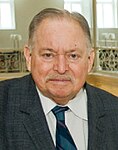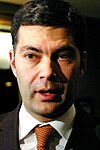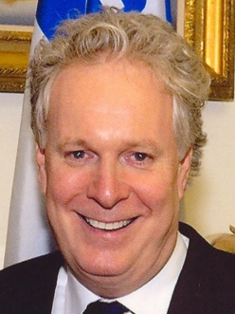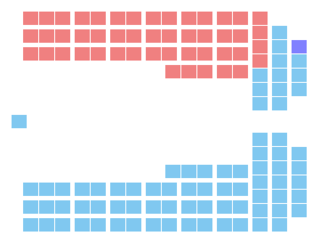| |||||||||||||||||||||||||||||||||||||||||||||
125 seats in the 35th National Assembly of Quebec 63 seats were needed for a majority | |||||||||||||||||||||||||||||||||||||||||||||
|---|---|---|---|---|---|---|---|---|---|---|---|---|---|---|---|---|---|---|---|---|---|---|---|---|---|---|---|---|---|---|---|---|---|---|---|---|---|---|---|---|---|---|---|---|---|
| Turnout | 81.58% ( | ||||||||||||||||||||||||||||||||||||||||||||
| |||||||||||||||||||||||||||||||||||||||||||||
 Popular vote by riding. As this is an FPTP election, seat totals are not determined by popular vote, but instead via results by each riding. Click the map for more details. | |||||||||||||||||||||||||||||||||||||||||||||
| |||||||||||||||||||||||||||||||||||||||||||||
The Quebec general election of 1994 was held on September 12, 1994, to elect members of the National Assembly of Quebec, Canada. The Parti Québécois, led by Jacques Parizeau, defeated the incumbent Quebec Liberal Party, led by Premier Daniel Johnson Jr.

The National Assembly of Quebec is the legislative body of the province of Quebec in Canada. Legislators are called MNAs. The Queen in Right of Quebec, represented by the Lieutenant Governor of Quebec and the National Assembly compose the Legislature of Quebec, which operates in a fashion similar to those of other Westminster-style parliamentary systems.
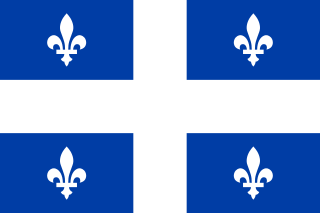
Quebec is one of the thirteen provinces and territories of Canada. It is bordered to the west by the province of Ontario and the bodies of water James Bay and Hudson Bay; to the north by Hudson Strait and Ungava Bay; to the east by the Gulf of Saint Lawrence and the province of Newfoundland and Labrador; and to the south by the province of New Brunswick and the U.S. states of Maine, New Hampshire, Vermont, and New York. It also shares maritime borders with Nunavut, Prince Edward Island, and Nova Scotia. Quebec is Canada's largest province by area and its second-largest administrative division; only the territory of Nunavut is larger. It is historically and politically considered to be part of Central Canada.

The Parti Québécois is a sovereignist and social democratic provincial political party in Quebec, Canada. The PQ advocates national sovereignty for Quebec involving independence of the province of Quebec from Canada and establishing a sovereign state. The PQ has also promoted the possibility of maintaining a loose political and economic sovereignty-association between Quebec and Canada. The party traditionally has support from the labour movement, but unlike most other social democratic parties, its ties with organized labour are informal. Members and supporters of the PQ are called "péquistes", a French word derived from the pronunciation of the party's initials.
Contents
Johnson had succeeded Robert Bourassa as Liberal leader and Premier. Both his father, Daniel Sr., and brother, Pierre-Marc, had previously served as premiers of Quebec as leaders of different parties.
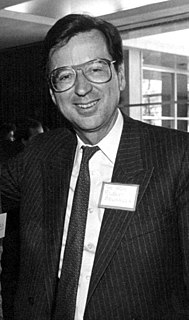
Robert Bourassa, was a Canadian politician from Quebec. He served as the 22nd Premier of Quebec in two different mandates, first from May 12, 1970, to November 25, 1976, and then from December 12, 1985, to January 11, 1994, serving a total of just under 15 years as Provincial Premier.
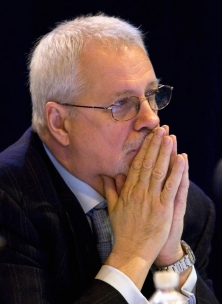
Pierre-Marc Johnson,, is a Quebec lawyer, physician and politician. He was the 24th Premier of Quebec from October 3 to December 12, 1985, making him the province's shortest-serving premier.
This election was very significant for Quebec history, because it set the stage for the 1995 Quebec referendum on independence for Quebec from Canada. In this referendum, the PQ's proposals for sovereignty were very narrowly defeated.

Quebec has played a special role in French history; the modern province occupies much of the land where French settlers founded the colony of Canada in the 17th and 18th centuries. The population is predominantly French-speaking and Roman Catholic, with a large Anglophone minority, augmented in recent years by immigrants from Asia. The political alienation of the Francophones from the Anglophones has been a persistent theme since the late 19th century. Tensions were especially high during the First World War. Historically, British merchants and financiers controlled the economy and dominated Montreal. The Catholic Church, in close cooperation with the landowners, led a highly traditional social structure in rural and small town Quebec. Much of that changed during the Quiet Revolution of the 1960s. Quebec's separatists, calling for an independent nation, gained strength but were narrowly defeated in two referenda. Quebec imposed increasingly stringent laws favouring the French language; many Anglophones left, as did many of the national and international corporations that had been based in Montreal.

The Quebec sovereignty movement is a political movement as well as an ideology of values, concepts and ideas that advocates independence for the Canadian province of Quebec.
Mario Dumont, a former president of the Liberal party's youth wing, and then leader of the newly formed Action démocratique du Québec, won his own seat, but no other members of his party were elected.

Mario Dumont is a television personality and former politician in Quebec, Canada. He was a Member of the National Assembly of Quebec (MNA), and the leader of the Action démocratique du Québec (ADQ), from 1994 to 2009. After the 2007 Quebec election, Dumont obtained the post of Leader of the Opposition in the National Assembly.

The Action démocratique du Québec, commonly referred to as the ADQ was a right-wing populist and conservative provincial political party in Quebec, Canada. On the sovereignty question, it defined itself as autonomist, and had support from nationalists and federalists. Its members were referred to as adéquistes, a name derived from the French pronunciation of the initials 'ADQ'.
In Saint-Jean there was a tie between incumbent Liberal candidate Michel Charbonneau and PQ candidate Roger Paquin. A new election was held on October 24 and was won by Paquin by a margin of 532 votes. [1]
Saint-Jean is a provincial electoral district in the Montérégie region of the province of Quebec. It comprises most of Saint-Jean-sur-Richelieu and all of Saint-Blaise-sur-Richelieu.
Michel Charbonneau is a Canadian politician, who represente the electoral district of Saint-Jean in the National Assembly of Quebec from 1989 to 1994.
Roger Paquin is a Quebec politician, he served as the member for Saint-Jean in the Quebec National Assembly as a member of the Parti Québécois from 1994 until 2003.
